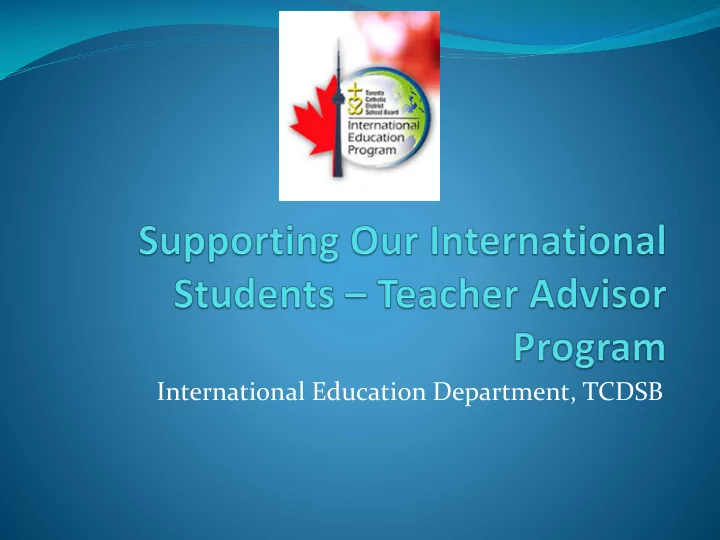

International Education Department, TCDSB
Challenges faced by international students/newcomers (high school) Unaccompanied adolescents living alone or with strangers To study in a completely different educational system Stages of puberty emotional unstable situation Tension, anxiety, depression Attendance problem (temporary) learning difficulties
Teaching Challenges Newcomers often have difficulty in the Canadian educational milieu for many reasons, including: Relating to how western culture perceives subjects Understanding the nature of instruction and differing teaching and learning styles Using academic language to discuss concepts and higher order thinking tasks Participating in class discussions and offering their opinions and supporting details on topics Writing in an appropriate academic style
The Three C’s Comfort Confidence Communication
COMFORT embarrassment frustration Courage to speak Sociocultural behaviors, beliefs Cultural exchange CONFIDENCE COMMUNICATION
Learning Languages – Alex Rawlings, a Polyglot
To help newcomers learn English, teachers can: Prepare daily lessons that have separate language and academic content objectives Build background knowledge to help students make connections to past learning and terms in their first language Make content understandable which helps provide meaning-making to aid student memory storage and retrieval Student engagement – provide opportunities for students to share ideas in groups and encourage cooperative learning, first in small groups to encourage more participation Allow students to practice and apply daily learning to help them consolidate skills Include visuals, hands-on, kinesthetic activities, anything to engage all the senses Use manipulatives, hands-on materials, drawings, and even real objects to help make the connections. Word walls, chants, music, raps, hand motions all allow different routes to the brain for memory retention Teach some word analysis skills such as looking for root words or related words such as ‘form’ in the word ‘information’ Allow strategic use of first language and personal dual-language dictionaries Permit the use technology in the classroom (i.e., cell phones) and the considered use of internet games and apps such as Google Translate, Dragon or Premier Use teacher and student modeling and think-alouds to help deconstruct difficult text or assignments Plan on ways to integrate the four skill areas of reading, writing, speaking and listening in all lessons, assignments and subjects. Using the four skill areas together helps students more readily assimilate essential vocabulary for brain storage Use dialogue journals, or learning logs to encourage daily feedback between teacher and student Connect the curriculum to students’ cultural backgrounds , such as their previous experience with number concepts, or the water cycle Provide explicit feedback and targeted questioning. Meet and discuss one-on-one with students, and focus on their most persistent errors Check frequently for understanding, asking students to describe difficulties, to rephrase and elaborate responses Provide opportunities for students to practice using new words immediately and on several occasions later to help consolidate learning Give students a choice, especially for review and assessment. Choice allows students numerous pathways to demonstrate their knowledge Use alternative forms of assessment - oral interviews, graphic organizers, computer applications Focus on content first, rather than language errors initially Talk about the importance of performance values (good work habits) versus marks or grades. Teach other character traits and learning skills such as resiliency, self-regulation, imagination, empathy, adaptability, collaboration, initiative, etc, and talk about what a growth mind-set is Praise effort and the belief in hard work to achieve goals
Support Upon Arrival High School Preparation Program Orientation Academic preparation Cultural exchange In school Teacher Advisor Program (TAP) On-going monitoring Various school assistance
Goals of Teacher Advisor Program to equip student with the appropriate learning and life skills for a better transition To build social bonding To create social engagement opportunities within the school community to provide additional English support to monitor the progress of new international students
Format 30 hour program over 10 weeks 20 hours: In-class instruction (with guided conversation) English Support Class Activities Skills Learning Activities Transition Student Ambassadors 10 hours: school based events (e.g. trips, orientation, etc )
Weekly meeting Twice a week A school staff – contact board resource teacher for program set up, structure and support Mandatory attendance Possible progress report to be sent home Template of “letter to parents/custodians”
Quick Start Distribute registration forms to all new International Students and newcomers to your school community that would benefit from this program. Suggested class size is approximately 10. Classes can begin as early as the first week of the semester and typically run for 10 weeks. Inform your principal or vice principals to contact our office
Registration Form
Attendance Sheet
Resource Guidebook Information will be sent to administrators Information letter to parents and/or custodians Registration form Template of class list
Learning a language -
Activity: Chit Chat CHIT Chat: Awareness of the concepts of sandwich and other foods
Samples Academic / Conversational Coping skills Peer bonding “chit - chat” A “Slang” a day Visiting a Doctor Reflective Journal “21 ways to make it better” Guided Journal Festive celebrations Cultural exchange (fashion show/ lunar year/ Halloween/ thanksgiving) Presentation (ppt)
“Chit - Chat”
A “Slang” a day!
Peer Bonding
Message from our Student Ambassadors
What did the new International students say?
Thank you!
Recommend
More recommend